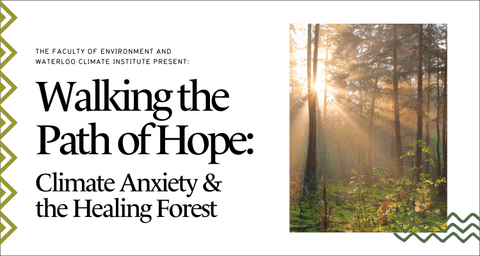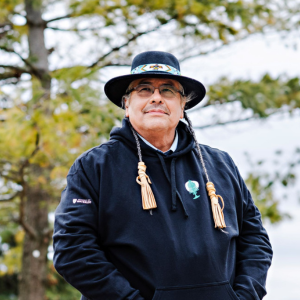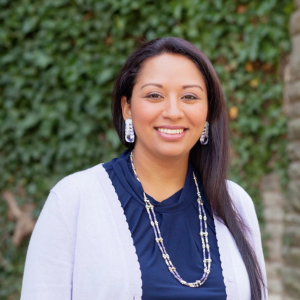
We invite you to a unique and empowering event that blends the themes of climate anxiety, the UWaterloo Healing Forest, Truth and Reconciliation, Indigenous healing and health, and Land Back. This gathering offers an opportunity to explore the deep connections between land, climate, and healing, while reflecting on our shared responsibilities.
The event will feature a fireside chat between Dr. Kelsey Leonard and Elder Myeengun Henry, who will share wisdom on the importance of land in Indigenous healing and cultural resilience. The conversation will also focus on how Indigenous perspectives can offer guidance in navigating the growing concerns around climate anxiety, particularly among young people.
Following the fireside chat, attendees will be invited to walk through the Healing Forest exhibit, a space dedicated to reflection on the impacts of colonialism and the resilience of Indigenous people. This immersive experience will provide an opportunity to connect and engage deeply with the themes of the day.
Together, we will walk a path of hope, guided by the wisdom of Indigenous knowledge, the strength of community, and the power of the land.
Date: Thursday, November 14
Time: 5:00-6:00PM
Location: Arts Lecture Hall, Rm 116
Speakers

Elder Myeengun Henry
As Indigenous Knowledge Keeper, Elder Henry provides strategic leadership to the Faculty of Health and our response to the Truth and Reconciliation Calls to Action. He collaborates with the Office of Indigenous Relations and with the Faculty of Health community, and identifies and contributes to building reciprocal and respectful relationships with Indigenous individuals and communities.
Elder Henry comes to University of Waterloo from Conestoga College where he was the Manager of Indigenous Services and a Professor of Indigenous Studies. He is the former Elected Chief and band councilor for Chippewas of the Thames First Nation. In addition to these leadership roles, he currently serves as Chair for the Ontario Provincial Police and Law society of Ontario Indigenous Advisory councils. Elder Henry also serves as an Indigenous ceremony conductor throughout Canada and the United States of America, traditional medicine practitioner, environmental protectionist, Indigenous counsellor, and Pow Wow coordinator.
Elder Henry is a member of the UW Indigenous Advisory Circle, which advises the Office of Indigenous Relations on indigenization and decolonization.

Dr.Kelsey Leonard, Shinnecock Nation
Dr. Kelsey Leonard is a water scientist, legal scholar, policy expert, writer, and enrolled citizen of the Shinnecock Nation. Dr. Leonard is an Assistant Professor in the Faculty of Environment at the University of Waterloo and Climate Institute member, where her research focuses on Indigenous water justice and its climatic, territorial, and governance underpinnings. Dr. Leonard seeks to establish Indigenous traditions of water conservation as the foundation for international water policymaking.
She represents the Shinnecock Indian Nation on the Mid-Atlantic Committee on the Ocean, which is charged with protecting America's ocean ecosystems and coastlines. She also serves as a member of the Great Lakes Water Quality Board of the International Joint Commission. Her regional ocean policy work in collaboration with Tribes, state, federal and fishery management council entities received a Peter Benchley Ocean Award for Excellence in Solutions.
“If we’re going to make innovative changes for water governance, it has to come from an interdisciplinary approach. We can’t solve these issues in isolation."
Note about the event
This event is open to all students, faculty and staff across the University Waterloo community. It is proudly hosted by the Faculty of Environment and the Waterloo Climate Institute as a precursor to the Environment Student Society's Wellness Week in an effort to support students in their self-care journey and navigate wellness concerns like climate anxiety.